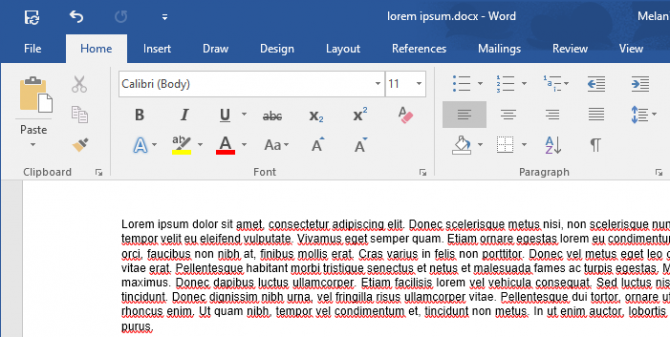Growing up, I was that kid who was always entering spelling competitions and spent a good chunk of her childhood memorizing how to spell advanced words at a young age. And when you’ve had a helicopter mom like I did who would try everything to make you spell more effectively, you know which tips online are actually helpful and which ones just make learning how to spell harder.
Sure, only a percentage of the human population will ever need to learn how to spell “logorrhea” correctly in their lifetime, and even a smaller percentage of them will have the ubiquitous spell-checking tech on search engines and word processors to help get the spelling right. But learning how to spell basic up to advanced words in the English language helps improve the way you communicate and remember words. And while English can be confusing to learn (did you know that, based on English language rules “ghoti” should be pronounced the same way you say “fish”?), these spelling tips can help you improve your vocabulary.
Research on Borrowed Words and Break Down Words
One of the reasons the English language is so confusing is because it is a mixture of all the languages it borrowed from. English has such a long history of evolution that, if we were to go back to its earliest form used by Germanic tribes, even the most fluent English speakers wouldn’t be able to understand English’s earliest form unless they spent years studying it in a university.
Today, English is a mixture of many languages that either still exist or are now considered dead languages. Some of these include Latin, French, Spanish, German, Greek. During the earliest European civilization, the English picked up words from other languages either through being conquered by other civilizations or through meeting and dealing with other civilizations for trade. As a result, the words were borrowed into the English language and many of the words we use today actually come from these languages.
It’s important to know this when you’re spelling because borrowed English words still retain the rules of their original language origin. For example, the phrase “faux pas” has French origins because the word “faux” is French. You might pronounce it as “Foe pa” and, if you don’t know how to spell the word, may be tempted to spell it as such. But when you recognize the word as a French word, you’ll know that there is a silent ‘x’ and ‘s’ that you need to add when spelling it.
In some cases, to find out its origins, you’ll need to break down words into syllables in order to trace its roots. Let’s use “solarium” (another word for a sunroom, sun parlor, or patio room) as an example. If we break down the word into two, we can see that it has Latin origins: “sol-“ (which means sun, hence “solar” for things related to the sun) and “-arium” (which means a place to keep something, hence “aquarium” for aqueous animals). From there, it becomes much easier to remember how to spell certain words.
This tip may sound tricky and you might think that you have to learn other languages before you can learn English, but this isn’t the case. You only need to remember the special rules, especially when it comes to silent letters, joint vowels, and other features in the language that may make it difficult to spell based on how the word is pronounced.
Study the Rules and then Learn the Exceptions
There are plenty of rules in the English language. For instance, you spell “receive” with an ‘ei,” but you spell “niece” with an ‘ie.’ You spell “station” with a ‘tion,’ but it’s ‘cion’ for “suspicion.” While there are plenty of rules to learn in your English classes, soon enough, as you learn more words and rules, you begin to see patterns forming and the way plenty of similar words combine letters, making it easy for you to logically guess how to spell a word right.

Once you’ve got that down, that’s when you can begin learning the exception to the rules. It’s much easier to learn the general rule used by majority of the English words. For example, “weird,” “niece,” and “height” all have the same similar sound, but you need to know when to use ‘ei’ or ‘ie.” While there is no one right way to learn all these exceptions, I think it’s mostly a matter of coming across these words and remembering that they don’t conform to the same rules that most other words use.
Read More
Having been a bookworm from a young age, I can assure you that this is one of the most effective ways to learn new words without even trying. Back when I had the time to read multiple books in a month, I’d often come across intermediate-level English words I wasn’t familiar with. If I couldn’t understand the context clues of the word based on how it was used in the book, I’d research what it means until I understood.

But what I didn’t know was that, by reading and learning new words, I was expanding my vocabulary and absorbing new information and new words without even trying. I didn’t even realize how much reading had improved my vocabulary at an advanced rate until a class in the fifth grade when my English teacher got angry that we were still using beginner-level examples for antonyms. She demanded that all of us stand up, and we weren’t allowed to sit down until we gave her better examples for antonyms. I was one of the few students who sat down on the first try because I simply remembered a word I read in one of my books.
If English isn’t your first language, you might find it easier to start with English translations of books you’ve read in your own language. Since you already know what’s going to happen in the book, you can pay more attention to the unfamiliar words and what they mean. You can also start with English magazines, news articles, or short online articles you can find online. This can help improve your grasp of the language slowly before you get to books that are much harder to read. And by developing the type of words you come across, you remember more words and how to spell them properly.
Mnemonics Can Work, But Don’t Overdo It
Plenty of the competitive spellers still use mnemonics and other memory aids because it’s an effective way to remember tricky words to spell. For example, as a kid, I used the phrase “busy business” to remember how to spell “business”to remember the position of the vowels before the –ness.

Or for trickier vowel positions for words like “piece,” one could remember that ‘I’ comes before ‘e’ by saying “piece of pie,” with the pie referring to the way of spelling the word. Some would even go far as to sing songs to help the spelling get stuck in their minds, albeit in a catchy tune.
Learning spelling through mnemonics can be more effective than simply looking at a word on paper until you can memorize the letters. Using rhyming, images, and patterns are more effective while learning because it’s easier to memorize a tune or a rhyme better than a bunch of letters on their own.
However, try not to overdo it. There was this one time my mom was trying to teach me a mnemonic to help remember how to spell the word “Christmas.” She then went on a long and tedious song about how the ‘C’ stands for the carolers, ‘H’ stands for the home decorated with tinsel, ‘R’ stands for the reindeer, and so on. I couldn’t remember how to spell Christmas that way, but I did by remembering that Christmas was Christ’s birthday, which only took a fraction of the time to make that mnemonic.
Don’t Let the Spellchecker Spoon-feed You
Plenty of people, including fluent English speakers, don’t really know how to properly spell intermediate and advanced English words because spellcheckers found in word processors like Microsoft Word, iWork Suite, and even the mobile operating system on your phone when you type have come a long way and can correct commonly misspelled words. Back then, if you were two letters off from the right spelling, spellcheckers would just underline that word in red to indicate that this word cannot be found in the English dictionary. Today, commonly misspelled words are easily corrected (try typing “corrected” with only one ‘r’ on your word processor and you might find it automatically fixed), with some mobile phones featuring auto-correct.

While this feature is convenient, don’t be too dependent on it. Sure, you can be forgiven from typing shortcuts when chatting with someone online, and it’s important to have your documents written with proper spelling. But if you rely too much on spellchecker without learning how you spelled something wrong, when it’s time for you to write with an actual pen or on something that doesn’t have a spellchecker, you may be unable to know the correct spelling because you relied too much on spellcheckers to fix it for you.
These are just some of the ways I’ve found can help improve your spelling skills. Don’t be worried if you’re unable to immediately spell everything perfectly – part of the process of learning is learning from your mistakes. With enough practice, you can soon find yourself improving the way you spell, which can improve the way you write and communicate with others.
















